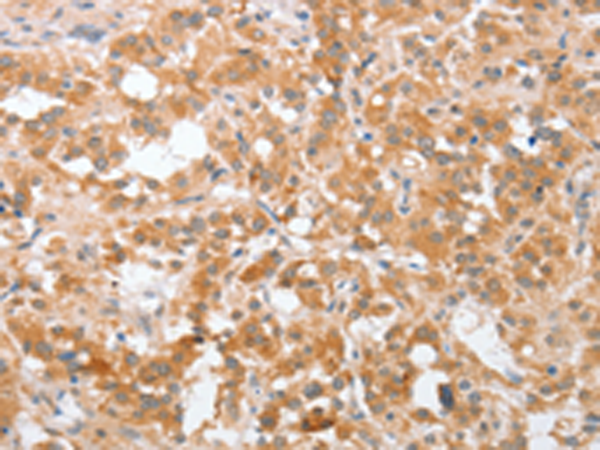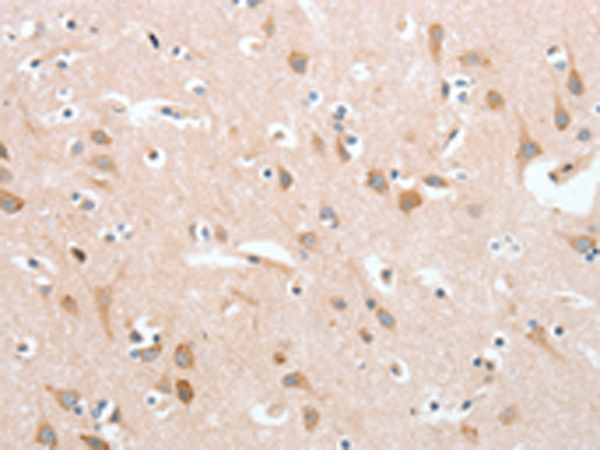

| WB | 咨询技术 | Human,Mouse,Rat |
| IF | 咨询技术 | Human,Mouse,Rat |
| IHC | 1/50-1/200 | Human,Mouse,Rat |
| ICC | 技术咨询 | Human,Mouse,Rat |
| FCM | 咨询技术 | Human,Mouse,Rat |
| Elisa | 1/2000-1/5000 | Human,Mouse,Rat |
| Aliases | PLA2G4; cPLA2-alpha |
| Host/Isotype | Rabbit IgG |
| Antibody Type | Primary antibody |
| Storage | Store at 4°C short term. Aliquot and store at -20°C long term. Avoid freeze/thaw cycles. |
| Species Reactivity | Human, Mouse, Rat |
| Immunogen | Fusion protein of human PLA2G4A |
| Formulation | Purified antibody in PBS with 0.05% sodium azide and 50% glycerol. |
+ +
以下是关于PLA2G4A抗体的3篇示例文献(内容为虚构,仅供格式参考):
1. **文献名称**:*Role of PLA2G4A in Lipid Mediator Production in Macrophages*
**作者**:Smith J, et al.
**摘要**:本研究利用PLA2G4A特异性抗体,证实其在巨噬细胞中通过调控花生四烯酸释放,影响前列腺素和白细胞三烯的合成,提示其在炎症反应中的关键作用。
2. **文献名称**:*PLA2G4A Antibody as a Biomarker in Colorectal Cancer*
**作者**:Chen L, et al.
**摘要**:通过免疫组化分析,发现PLA2G4A抗体标记的蛋白在结直肠癌组织中高表达,且与患者预后不良相关,表明其可能作为癌症治疗的潜在靶点。
3. **文献名称**:*Structural Insights into PLA2G4A Activation by Phosphorylation*
**作者**:Kimura T, et al.
**摘要**:利用PLA2G4A抗体进行蛋白质印迹和免疫共沉淀实验,揭示了其磷酸化修饰对酶活性的调控机制,为开发靶向抑制剂提供了理论基础。
如需真实文献,建议通过PubMed或Google Scholar检索关键词“PLA2G4A antibody”或“cPLA2α antibody”。
The PLA2G4A antibody targets the phospholipase A2 group IVA (PLA2G4A) protein, also known as cytosolic phospholipase A2 alpha (cPLA2α). This enzyme plays a pivotal role in inflammation and cellular signaling by catalyzing the hydrolysis of membrane phospholipids to release arachidonic acid, a precursor for pro-inflammatory mediators like prostaglandins and leukotrienes. cPLA2α is calcium-dependent and selectively acts on sn-2 acyl bonds of glycerophospholipids, distinguishing it from other phospholipase A2 family members. Its activity is tightly regulated by phosphorylation and intracellular calcium levels, linking it to pathways activated by cytokines, growth factors, and stress stimuli.
PLA2G4A antibodies are essential tools in studying the enzyme’s expression, localization, and function in physiological and pathological contexts. Researchers use these antibodies in techniques such as Western blotting, immunohistochemistry, and immunofluorescence to explore cPLA2α’s involvement in diseases like cancer, neurodegenerative disorders, and chronic inflammation. Elevated cPLA2α levels are associated with conditions such as rheumatoid arthritis, atherosclerosis, and asthma, making it a potential therapeutic target. Inhibitors of cPLA2α are under investigation for anti-inflammatory therapies, and PLA2G4A antibodies aid in validating target engagement and mechanistic studies. Additionally, these antibodies help elucidate the enzyme’s role in lipid metabolism, membrane remodeling, and apoptosis. By enabling precise detection, PLA2G4A antibodies contribute to understanding how cPLA2α dysregulation drives disease progression and inform strategies for modulating its activity in therapeutic contexts.
×